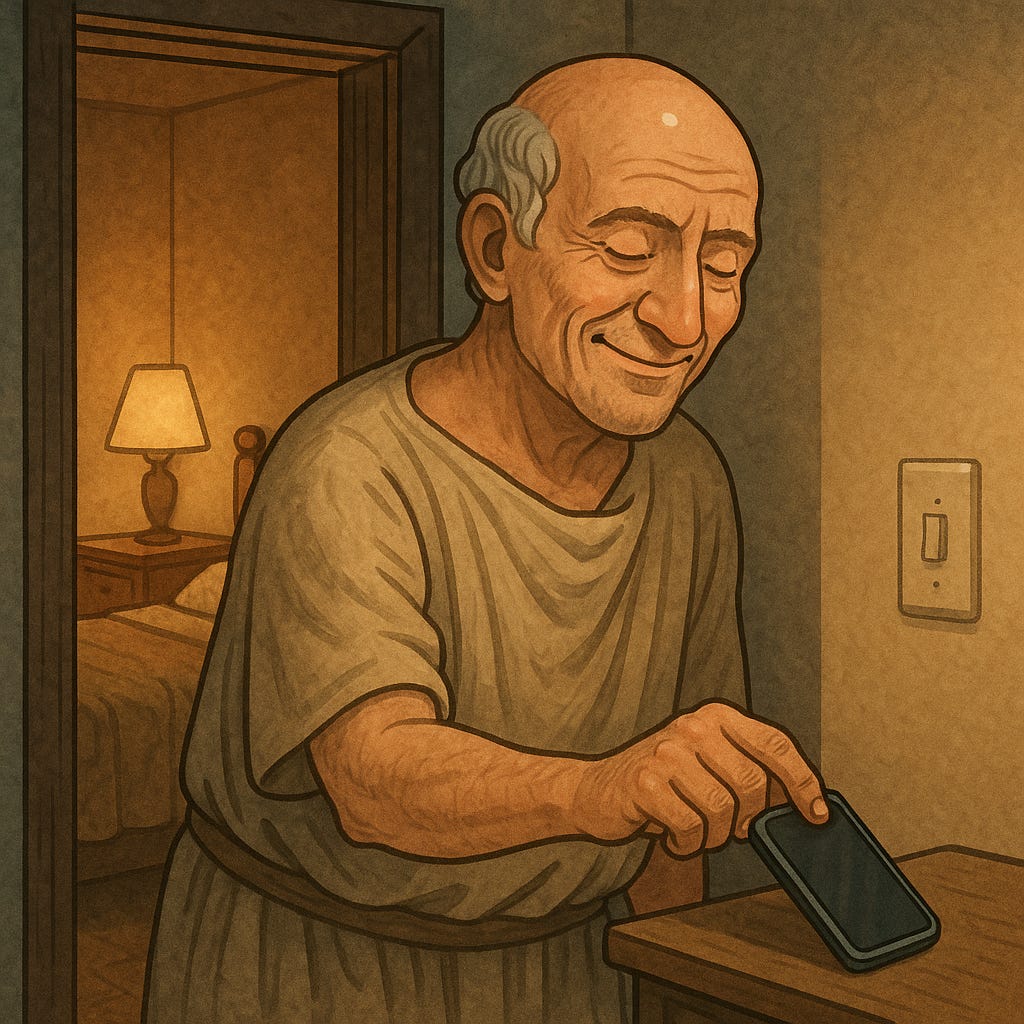[Antifragile 4 🔥] Aldous Huxley's warning, Tech & Seneca, Lion Tracker's Guide to Life, Yahia Lababidi on listeners
#54: a weekly 4-item newsletter created to inspire dads to use the challenges of fatherhood as fuel for building an incredible life & an antifragile mind.
Welcome to the 54th edition of the antifragile 4 🔥.
I apologize for ghosting last week. Time and energy was sucked mercilessly into a black hole of boxes and moving logistics 🛸. Moving is brutal.
But I write to you know from our new home in Denver.
Most of those boxes remain unpacked. They’ll probably stay that way for a while. I’m good with that.
Right now we’re enjoying that feeling of novelty that comes from inhabiting a new place. Meeting the neighbors. Wandering aimlessly. Soaking in all the things I’ll take for granted in a few months.
This period has also been barren of healthy food, quality sleep, exercise and just about anything on my “feel good” list.
And that’s ok.
Periods of interruption can be a beautiful thing. They allow us to reset and recalibrate. I intend to use this for both.
Good to be back :)
Love,
Chris
—
Here’s this week’s antifragile 4 🔥:
[deep thought 🌊] Neil Postman 📺 📚 on Aldous Huxley’s warning
relating Seneca 🏛️📲 to technology use
The Lion Tracker’s Guide to Life 🦁 on how to get anywhere
Yahia Lababidi👂on good listeners
—
1.) [deep thought 🌊] Neil Postman 📺 📚 on Aldous Huxley’s warning
In the last edition, I included an excerpt from Neil Postman’s Amusing Ourselves to Death. After diving into is again, I realized it needed it’s own section.
Our world has begun to slide in the direction of Adlous Huxley’s warning in Brave New World. A world where “the truth would be drowned in a sea of irrelevance”. These warnings ring eerily true today.
It’s worth noting that Postman originally wrote this in 1985, years before 24/7 cable news & social media ever reared their ugly heads. Prescient!
What Orwell feared were those who would ban books. What Huxley feared was that there would be no reason to ban a book, for there would be no one who wanted to read one.
Orwell feared those who would deprive us of information. Huxley feared those who would give us so much that we would be reduced to passivity and egoism.
Orwell feared that the truth would be concealed from us. Huxley feared the truth would be drowned in a sea of irrelevance.
Orwell feared we would become a captive culture. Huxley feared we would become a trivial culture, preoccupied with some equivalent of the feelies, the orgy porgy, and the centrifugal bumblepuppy.
As Huxley remarked in Brave New World Revisited, the civil libertarians and rationalists who are ever on the alert to oppose tyranny “failed to take into account man’s almost infinite appetite for distractions.”
In 1984, Huxley added, people are controlled by inflicting pain. In Brave New World, they are controlled by inflicting pleasure.
In short, Orwell feared that what we hate will ruin us.
Huxley feared that what we love will ruin us.
Neil Postman, Amusing Ourselves to Death
2.) relating Seneca 🏛️📲 to technology use
So…if Aldous Huxley is right and we’re drowning ourselves in the pleasure & irrelevance that technology brings, what is the solution?
Do we go full Amish? Get a dumb phone? Turn hermit in the hills?
I was pondering this idea when a passage from Seneca popped in my head.
It shows much more courage to remain dry and sober when the mob is drunk and vomiting; but it shows greater self‑control to refuse to withdraw oneself and to do what the crowd does, but in a different way, — thus neither making oneself conspicuous nor becoming one of the crowd. For one may keep holiday without extravagance.
Seneca, Moral Letters to Lucilius (Letter XVIII)
It speaks to how true self control is not to withdraw or abstain, but to partake “without extravagance”.
To go to the party, have one drink and go home.
To use technology without being used by it.
And so considering the fact that abstaining from a smartphone in our modern world is essentially not an option, partaking without extravagance is the best option we have.
Just as Cal Newport says in Digital Minimalism…
…we cannot passively allow the wild tangle of tools, entertainments, and distractions provided by the internet age to dictate how we spend our time or how we feel. We must instead take steps to extract the good from these technologies while sidestepping what’s bad.
This is the balance we need to strike.
We can’t not use technology. Plus it can bring amazing value.
But overconsumption wastes our precious days (and brain cells).
So delete the apps. Block the sites. Put the laptop away. Sleep and walk without your phone.
And find boredom where you may have otherwise found distraction. Find real connection where you may have otherwise synthesized it. Reconnect with the reality that makes this a wondrous place to exist.
3.) The Lion Tracker’s Guide to Life 🦁 on how to get anywhere
I don’t know where I’m going but I know exactly how to get there.
Boyd Varty, The Lion Tracker’s Guide to Life
I love this line. And this book, for that matter.
This is what it speaks to, for me:
Trust your process, the score takes care of itself.
Anxiety lives in the future. Happiness & fulfillment live in the present. Be present.
Habits > Goals
4.) Yahia Lababidi👂on good listeners
A good listener is one who helps us overhear ourselves.
Yahia Lababidi
AI Image of the Week 🤖 🎨
Seneca practicing healthy technology habits
Two last things for you this week:
Find one way to use technology more consciously this week. Maybe that means less.
Be fire and wish for the wind 🔥
With love,
Chris
—
Did this edition resonate with you? Sharing is caring. Send to a fellow antifragile dad.


